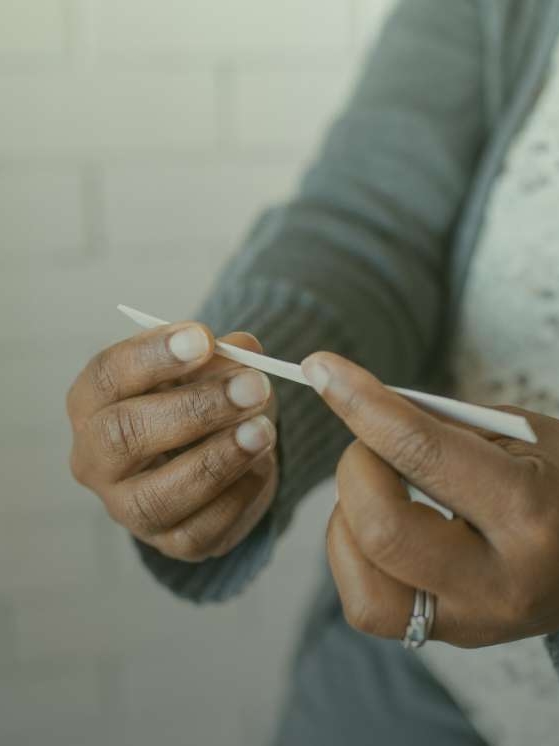Trying to get pregnant is a rollercoaster of emotions, exciting, overwhelming, frustrating, and more…. Whether you are trying to conceive for the first time or have been struggling for a while to get pregnant, here are 14 tips that can help increase your chances of success.
Track Your Menstrual Cycle: Knowing When You Ovulate Is Key To Getting Pregnant
Ovulation is the time when an egg is released from your ovary to be fertilised. The most fertile days for you to conceive are the days leading up to and including ovulation. To track your menstrual cycle and predict when you will ovulate, you can use a fertility tracker. To track your basal body temperature, use an ovulation calculator or use ovulation strips to measure your luteinizing hormone levels. It is best to track every day in your cycle when you first start (except when you have your period). Although for most women, ovulation is in the middle of their cycle. It may be a few days earlier or later for you.
Have Regular Frequent Sex
Aim to have sex every other day during your most fertile days. This will increase your chances of getting pregnant because sperm can live inside your body for up to five days. Having sex leading up to ovulation will increase the chances that sperm will be present when the egg is released.
Use A Sperm-Friendly Lubricant
Certain lubricants can kill sperm, so it is important to use a fertility-friendly lubricant if you are trying to get pregnant. These types of lubricants, such as Conceive Plus are formulated to be sperm-friendly and won’t harm sperm as regular lubricants can.
Maintain A Healthy Diet
A healthy diet can help increase your fertility and improve your chances of getting pregnant. Aim to eat a variety of fruits, vegetables, whole grains, and lean proteins. Avoid processed foods and unhealthy fats, as they can decrease fertility.

Stay Hydrated
Drinking plenty of water can help improve fertility by keeping your cervical mucus thin and favourable for sperm. Aim to drink at least eight glasses of water a day.
Quit Smoking
Smoking can reduce fertility in both men and women. If you or your partner smokes, quitting can improve your chances of getting pregnant.
Reduce Stress
High levels of stress can affect fertility. Try to find ways to reduce stress in your life, such as through meditation, yoga, exercise, or even just having a lovely bubble bath!
Get Enough Rest
Getting enough sleep can help improve fertility. Aim for 7-9 hours of sleep per night.
Get To A Healthy Weight
Being either underweight or overweight can affect your fertility. A healthy body mass index (BMI) is important for fertility. You can calculate your BMI on our site, and if it is outside of the normal range, then talk to your doctor.

Avoid Certain Medications
Some medications can affect fertility. If you are taking any medications and are trying to get pregnant, talk to your doctor about whether they could be impacting your fertility.
Take Prenatal Vitamins: It’s best to start taking prenatal vitamins as soon as you start trying to conceive. These vitamins contain important nutrients like folic acid, which can help prevent birth defects of the brain and spine.
Don’t Wait Too Long: As you age, your fertility decreases. Women are most fertile in their 20s and early 30s, and fertility starts to decline slowly after the age of 35. If you’re over 35 and have been trying to get pregnant for six months without success, it is a good idea to speak with your doctor. If you are under 35, usually the general rule is to give it a year of trying before talking to your doctor. On average, a healthy couple takes 12 months to conceive.
Consider Fertility Treatments: If you have been trying to get pregnant for a year or more and have not been successful, you may want to consider fertility treatments. These treatments, such as in vitro fertilisation (IVF), can help increase your chances of getting pregnant. Talk to your doctor first before going down this path.
Be Patient: It can take time to get pregnant, and it’s important to be patient and stay positive. If you’ve been trying to get pregnant for a while without success, speak to your doctor. They can help you identify any potential issues and suggest treatment options.
Overall, the key to getting pregnant is to be aware of your menstrual cycle, have regular, unprotected sex during your fertile window, maintain a healthy lifestyle, and be patient. If it is taking longer than a year, talk to your doctor; they can help you identify any potential issues and suggest treatment options. We are sending you lots of baby dust….
About Hoopsy
Hoopsy is on a mission to make healthcare more sustainable—starting with eco pregnancy test kits. Our plastic-free, paper-based hCG pregnancy test strips reduce waste without compromising accuracy. We believe better health starts with better choices—for you, and for the planet.
Learn More About…








